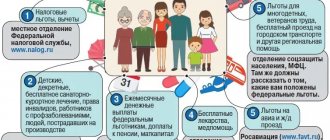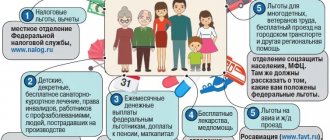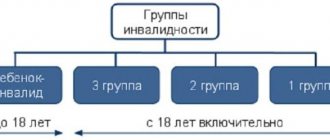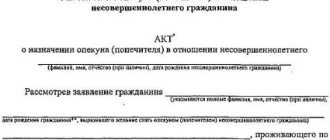2
Legal capacity is the ability of a citizen to have civil rights and bear civic responsibilities. A person is granted legal capacity upon reaching 18 years of age. However, in some cases he may be deprived of his rights due to health conditions. To exercise civic duties, a person must be aware of the consequences of his actions. The law provides for the need to care for persons who lack legal capacity. Let's look at how to arrange guardianship over a disabled person of groups 1, 2, 3.
Guardianship of a disabled person from the point of view of the law
Guardianship is part of family law and, accordingly, is regulated by the Family Code of the Russian Federation. This law prescribes duties with rights in relation to both the guardian and his ward. In addition, general points on the topic of guardianship and trusteeship are presented in the Civil Code of the Russian Federation.
Experts add the following: if the matter concerns guardianship of a person with group 1 disabilities, it is worth additionally taking into account the norms of the Government of the Russian Federation No. 343 of June 4, 2007 and the provisions of Federal Law No. 48 of April 24, 2008.
List of benefits
In addition to the statutory payments, additional benefits
designed to support them and directly the disabled person of group 1:
- Discounts on housing and communal services (50%);
- The guardian may have the opportunity to use the property of the ward (without prejudice to his interests)
- Payments for guardianship of disabled parents and disabled children.
To obtain the required benefits, a guardian who has officially received this status will need to contact the territorial department of the Pension Fund . If patronage is provided, then the corresponding payments are made from the funds of the ward.
Expert opinion
Volkov Georgy Tarasovich
Legal consultant with 10 years of experience. Specializes in the field of civil law. Member of the Bar Association.
It is important to remember that the amount of financial support should be agreed upon by all participants - the guardian and the ward. All points, including the financial component, are specified in the contract.
However, the maximum amount of such payment cannot exceed 5% of the total income of the person under guardianship.
Thus, financial support is provided for guardianship of a disabled person of the first group. The amount is small, but it allows us to provide assistance to each party. Guardians must prove they have played a positive role in the life of the disabled person and may be required to provide reports. Payments to guardians are made based on submitted documents.
For information on cash payments for guardians of disabled people, see the following video:
Guardianship of a disabled person of group 1 is established by application. The procedure is possible if a person with disabilities is declared incompetent. Incapacity implies that a citizen is unable to acquire rights and bear civil liability for his actions.
Understanding guardianship and its types
Guardianship in simple words is when one capable citizen represents the interests of another person who, due to limited capabilities, is recognized as incompetent and in need of comprehensive assistance.
In general, guardianship is much broader and involves not only caring for a disabled person who is practically incapable of any independent actions. In fact, the guardian still has to protect his interests, if necessary.
Guardianship consists of:
— providing care for those in need of group 1;
— management of property belonging to a disabled person, as well as ensuring its safety;
— organizing conditions and everything that may be needed to maintain the health of a person under care in group 1.
As for the forms (types) of guardianship, there are not many of them. This is patronage, guardianship and full guardianship. Let's look briefly at each type.
1) Patronage
most often implemented if the case concerns a legally competent adult citizen, and the parties enter into an agreement. But this form of guardianship is not excluded in relation to disabled people with group 1, if they are unable to fulfill their duties and represent their rights.
2) Guardianship
can establish if the fact of limited legal capacity of a person is recognized in court. Or persons aged 14-18 years are considered. It is worth considering an important point: guardians have the right to give consent to the execution of transactions in which a disabled person is involved, but they should not carry out transactions on behalf of the ward. Simply put, the guardian only approves the fulfillment of the duties and rights of the ward.
3) Guardianship
is fully applicable if a person is incompetent (this is recognized by the court) or is in fact such, that is, the age of the ward plays a role here - up to 14 years.
Important
! The guardian of a disabled person of group 1, as the legal representative of his interests, is provided with a full set of duties and rights of the person under guardianship.
Disability groups
The rights of people with disabilities in Russia are protected at the federal level - the law “On the social protection of people with disabilities in the Russian Federation” has been in force for more than 20 years, with annual amendments and additions. According to its standards, the most severe is the first group of disabilities, when a person practically cannot serve himself in the simplest everyday situations. This group is prescribed for permanent disability, established by a medical report after examination by doctors of different specialties.
These can be those people who acquired the disease during their lifetime and it has passed into the last, incurable stage (oncology, diabetes, loss of limbs, etc.) or those who have not had hearing, vision and other functions of important organs since birth.
It is clear that such patients need constant care and assistance from relatives or social workers.
The second group of disabilities involves the presence of severe and moderately severe diseases, but for the most part such people can care for themselves with the help of certain technical devices (for example, mobile wheelchairs).
Taking into account significant restrictions in movement, loss of organ functions, etc., such persons, rather, do not need round-the-clock care, but periodic assistance.
The third group includes cases of persistent chronic diseases that require almost constant attention from doctors, but do not exclude the ability to work - usually the person has it in full.
For example, you can determine the capabilities of disabled people of the first and second groups in the following table:
| Disabled people of 1st group | Disabled people 2nd group | |
| Personal care | Impossible, complete lack of self-service | Possible with the help of an assistant |
| Movement | Impossible | Possible with the use of technical means/human assistance |
| Work ability, training | Impossible | Possible in specialized institutions |
| Control of your actions | Mostly impossible | When taking medications, with the help of other persons and medical staff, it is possible |
| Orientation in society | Mostly absent | Using special technical means or third-party assistance, there is |
All pathologies that are the basis for the status of “disabled” must be confirmed by a special medical and social examination, the conclusion of which will indicate the presence of congenital or acquired deficiencies with which a person cannot perform basic self-care.
Since disabled people of the first and second groups are the most vulnerable categories, especially in dire need of attention and care, federal legislation regulates in detail all issues related to the guardianship of such people. In addition, when it is established, civil law rules apply that determine the requirements for candidates, as well as circumstances that exclude the possibility of becoming guardians.
There are two main forms of care for people with disabilities: guardianship and patronage. Guardianship is most often established over disabled people of group 1.
Who can be a guardian of a disabled person?
The candidate must meet a number of requirements, and the family connection between the ward and the potential guardian is of great importance. In general, the identity of the guardian must be subject to the following conditions:
- full legal capacity, that is, reaching the age of majority in order to fully legally bear responsibility for oneself (first of all);
- age up to 60 years (preferably), since pensioners often need help themselves and guardianship authorities are in no hurry to approve guardianship for them (there are no prohibitions in this regard in the law);
- absence of previous facts of deprivation of parental rights or cancellation of adoption, as well as offenses, addiction to alcohol or drugs, convictions for intentional crimes against health and life;
- non-involvement in same-sex relationships, that is, relationships can be, but only with a representative of the opposite sex;
— the presence of moral principles and qualities that will be welcomed by representatives of the guardianship authorities.
Plus, the health status of the guardian must be taken into account, who will have to undergo a medical examination before registering his new status. Experts, focusing on Government Decree No. 117 of February 14, 2013, do not allow, for example, citizens with:
- tuberculosis;
— disability of 1st group;
— substance abuse, drug addiction, alcoholism;
— oncology in stages 3 and 4 or stages 1 and 2 (if the candidate refuses treatment);
— behavioral and mental disorders until the termination of medical supervision;
- illnesses of a chronic and infectious nature, if complete recovery is not recorded.
Additionally, the future guardian must confirm that he has:
- owning a living space that meets sanitary and other standards (in any case, the new tenant should be comfortable in the space);
- a certain level of income that allows you to take care of the ward (certificates from work and other required documents are attached).
Important
! When considering a request, the guardianship and trusteeship authorities must take into account the opinion and desire of the potential ward, as well as his relationship with the guardian (for example, are they relatives or close friends, etc.).
Who can become a guardian for a person with a disability?
The main requirements for guardians of disabled people are the following:
- An adult capable citizen of the Russian Federation can become a guardian.
- The guardian must not have a criminal record for serious or especially serious crimes, as well as a valid suspended conviction.
- He must have a stable monthly cash income.
- The guardian cannot have the first group of disability, cancer (except for cancer with stable remission), or tuberculosis.
- He should not be registered at a drug treatment clinic.
- The potential guardian must have his own living space (owned or under a social tenancy agreement).
- Must have a certificate of completion of a caregiver training course. Close relatives of the ward are exempt from training.
Rights and responsibilities of a guardian
Current legislation strives to respect and protect the interests of wards, therefore it gives the guardian specific responsibilities and rights. In particular, the person receiving guardianship automatically undertakes to guarantee to the ward:
— protection of property rights;
- implementation of the benefits provided to him;
— payment for various payments, taxes, etc.;
— acceptance of the inventory of property transferred in favor of the person under the care of third parties;
— provision of personal hygiene products, food, medicines and everything necessary;
- care, health care and timely organization of treatment measures, seeking medical care at the hospital, if necessary;
— submission of reports on expenses to the guardianship authorities.
At the same time, the guardian is given the right to control the actions of the ward and to use his funds (of course, in the interests of the person to whom the money was intended). Finally, during a dispute or trial, the guardian is the legal representative of his ward.
Guardianship procedure
To acquire the status in question, the applicant must prepare and submit to the authorized authority:
— autobiography;
- application (written on the spot);
— marriage certificate (copy), if available;
— a copy of the homeowner’s document or an extract from the house register;
— confirmation of completion of special training (usually special courses are needed if the ward is in a difficult condition);
- consent of all family members, starting from the age of ten, for a new person to live with them.
Plus, they ask for information:
- no criminal record;
— from doctors about the applicant’s good health;
- from the place of work about the salary for the last year;
— on receiving pension payments (for pensioners);
— on the compliance of housing with technical and sanitary standards.
Important
! If the potential guardian is not employed, he will have to provide other proof of income in a certain amount.
Benefits for guardians of disabled people of groups 1, 2 and 3
Now let's look at some of the preferences that are provided for those caring for incompetent citizens with disabilities. To be more precise, the guardian of a disabled person of group 1 can travel with him free of charge on public transport or to the sanatorium (and back) as an accompanying person.
But in the case of guardianship of disabled people of category 2, there are no relaxations. The same applies to citizens with group 3. By the way, it is quite difficult to obtain guardianship over the latter, since this status is considered able-bodied. But perhaps the guardian will achieve the right to manage the payments and pension of the disabled person by submitting reports to the guardianship authorities (the funds must be directed exclusively to the needs of the ward).
Several other points on the topic are noteworthy, namely:
— if an officially unemployed guardian takes care of a ward who is over 80 years old, he can arrange an additional payment of 1,200 rubles through the Pension Fund (the amount is paid together with the disabled person’s pension);
— a 50% discount on the payment of utility bills applies only to a citizen with disabilities, and the rest of the family members living with him pay the full cost.
How much do caregivers get paid?
Payments to persons who decide to become guardians have not been indexed for more than 10 years (since 2008) and today amount to:
— 1200 rubles, if the ward received the status of a person with disabilities during his life;
— 10,000 rub. required to care for a disabled child or a disabled child (only parents or guardians, and the unemployed).
Important
! If a relative is caring for a disabled citizen, 10,337 rubles are charged. social pension. If a relative does not have a job, he is entitled to a payment equal to 60% of the minimum wage.
What benefits are there for guardians?
Expert opinion
Stanislav Evseev
Lawyer. Experience 12 years. Specialization: civil, family, inheritance law.
Benefits for guardians are provided only for representatives of disabled children. Guardians of adult citizens deprived of legal capacity do not have additional support
From 2021, the payment to the guardian of a disabled child who performs his duties free of charge has been increased to 10,000 rubles . (Decree of the President of the Russian Federation of 2013 No. 175) Moreover, it is subject to change due to the regional coefficient.
Payment to guardians of an adult citizen remains at the level of 1,200 rubles . To obtain it, you must provide a certificate from the medical commission about the need for constant outside care for the ward.
To receive benefits, the representative must contact the Pension Fund of the Russian Federation. The payment is of a declarative nature.
Involuntary revocation of guardianship
To trigger the removal of caring responsibilities from a carer, a number of steps must be taken. A person caring for a needy person can do this himself. And if we talk about forced termination of guardianship, this action occurs due to the guardian’s violation of his obligations to the ward.
Let's say a citizen spends money on himself, and not on the person under his care, and does not submit a report to the competent authorities. Or the guardian made some kind of transaction with the property belonging to the ward. Situations may vary.
Be that as it may, if there is evidence of non-compliance with the rights of the ward, any person can contact the guardianship authorities with a complaint and begin the procedure for depriving the guardian of his powers.
A special commission will verify the veracity of the appeal and, if violations are detected, will bring the culprit to administrative or criminal liability. Also, this person will no longer receive guardianship status.
Responsibilities towards the ward
The person caring for a disabled person is not only responsible for his health, providing food, medicine and clothing, but also the obligation to wisely manage the funds coming into the account. Thus, before February 1 of each year, it is necessary to provide a full report on the expenditure of all money received for the maintenance of the ward.
For 2021, disabled people are paid:
- monthly payment (3rd group – 1919.3 rubles, 2nd group – 2397.59 rubles, 1st group – 3357.23 rubles);
- disability pension (average value for Russia) – 8453 rubles;
- insurance pension – 2279.47 rubles. (3rd group), 4558.93 (2nd group), 9117.86 rubles. (1st group). If there are dependents, the amount will be larger depending on their number;
- social disability pension. For example, 1st group – 9919.73 rubles. (from childhood - 11,903.51 rubles), etc.;
- the cost of a set of social services is 995.23 rubles. (medicines, treatment in a sanatorium, etc.);
From time to time, regulatory authorities visit a disabled person at his place of residence, draw up a report on his quality of life, the provision of benefits to him, and the absence of violations on the part of the person caring for him. In some cases, when a violation of the rights of the ward is revealed - lack of food, unsanitary conditions, improper spending of funds or failure to take measures to preserve property, the guardianship authority draws up a conclusion on the termination of guardianship in the person of a certain citizen, after which work begins to find a new candidate.











